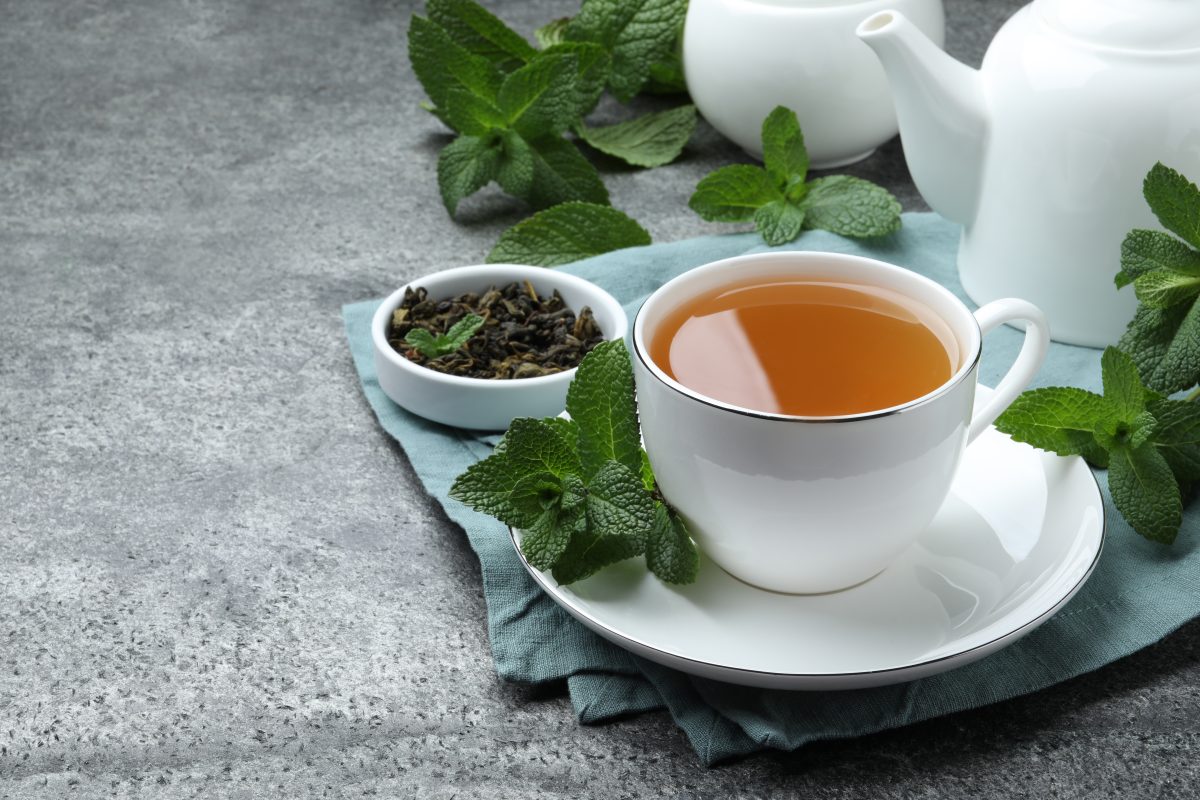Peppermint Tea & IBS: A Guide to Relieve Digestive Discomfort
- Dietary Advice (non Low FODMAP)
If you suffer from IBS, you may wonder if peppermint tea will help your IBS symptons.
This article will outline what the research has found around peppermint and IBS relief if peppermint tea can help with IBS, the types of peppermint, and its health benefits.

What is Peppermint tea?
Peppermint tea is aromatic and naturally sweet in flavor; it is a caffeine-free herbal tea that is made by infusing mint leaves in hot water.
It is a herb and a cross between two types of mint: watermint and spearmint. Peppermint is indigenous to Europe and the Middle East but is now cultivated worldwide.
You can eat peppermint in its natural form as a leaf and as an essential oil extracted from the flowering part and leaves of the peppermint plant.
It is known for its therapeutic effects, and its flavor is commonly used in body and food products and drinks.
Does Peppermint Tea Help IBS?
Peppermint tea has not been researched for its effects on IBS; however, peppermint oil has been researched in relation to IBS.
Studies have shown peppermint oil is a safe and effective short-term treatment for IBS by reducing IBS symptoms and abdominal pain due to its antispasmodic abilities (2, 3, 4).
To learn more about peppermint oil for IBS, check out our post: Peppermint Oil Capsules and IBS – Do They Actually Work?
Is peppermint tea low FODMAP?
Yes, peppermint tea is low FODMAP (1).
If you are on the low FODMAP diet, this means you will be able to enjoy peppermint tea for your IBS without worry.
If you would like to find out about other low FODMAP tea, check out our other post ‘what is the best tea for IBS.’
What are the different varieties of peppermint tea?
It may surprise you to find that there are two main varieties of peppermint tea: mitcham and black mitcham.
Below, we have explained the difference between the two.
Mitcham
‘Mitcham’ is the variety of peppermint you might be most familiar with. It has dark green, smooth leaves and is the peppermint you most likely reach for in the supermarket.
Mitcham peppermint has the classic full-bodied peppermint aroma, perfect for making a cup of aromatic peppermint tea.
Black Mitcham
Black Mitcham is also a popular variety of peppermint; it has an oval, pointed shape with serrated edges and slightly dark red and bronze markings on its leaves.
It has a strong flavor is used to make teas and sweet desserts such as cakes and chocolates.
There are many other varieties of peppermint leaves that are slightly less common, which include:
- Agnes – has a mildly aromatic flavor and is rich in menthol
- White peppermint – has a milder taste compared to other peppermint varieties
- Variegated peppermint – has a fragrant, minty taste
- Chocolate mint – has a full-bodied, citrusy flavor
- Black peppermint – has a cold, clean, sharp mint flavor
- Orange peppermint – has a minty, sweet, berry-like flavor
- Lemon mint – has a delicate, fresh lemon flavor
Peppermint Tea Brands
If you are looking to purchase a peppermint tea rather than make it, there are multiple options available in the shop.
Below, we have listed some common brands found in both the UK and US.
UK Peppermint Tea Brands:
- Twinings Pure Peppermint Tea
- Teapigs Peppermint Tea
- Taylors of Harrogate Pure Peppermint
- Clipper Organic Peppermint
American Peppermint Tea Brands:
- The Tao of Tea Peppermint
- Harney & Sons Peppermint Herbal
- The Tea Spot Peppermint Tea
- Buddha Teas European Peppermint Tea
Are there other types of mint?
With mint being a popular herb to grow and include in your drinks and meals, you may not be aware that there are around thirty species of mint to choose from.
Peppermint is only one type.
Some other examples include:
- Peppermint
- Spearmint
- Water mint/Brook mint
- Pennyroyal mint
- Mojito mint
- Moroccan Mint
- Nana mint
- English Mint
- Apple mint/round-leaved mint
Other than peppermint helping IBS, what are the other health benefits?
Due to its many wonderful health benefits, peppermint is known for its multi-purpose use in its natural form, as oil, and in teas.
Studies have found that peppermint oil effectively reduces the intensity, frequency, and pain of migraines and headaches (5, 6).
One study found that peppermint in a topical ointment may help with wound healing, preventing infection, and reducing pain due to its antibacterial effects (7, 8).
Research has also shown that inhalation or consumption of peppermint oil helps to reduce mental and physical fatigue (9, 10, 11, 12).

Make it yourself: Peppermint Tea Recipes
Peppermint tea is an easy and delicious drink using peppermint tea bags or homemade tea with fresh peppermint leaves.
However, there are also some recipes for peppermint drinks that you may enjoy making for yourself:
- Fresh Mint Tea
- Refreshing Mint Tea
- Peppermint Tea Latte Low FODMAP
- Icy Mint Tea Recipe
- Rosemary Peppermint Tea
- Iced Mint Green Tea
Summary
Peppermint tea is a sweet and aromatic herb often used in various products, including body, food, and drink products.
There are many different types of mint, including peppermint, a common type of mint used frequently in tea and sweet desserts.
Peppermint tea has no known benefit for people with IBS. However, stronger versions of peppermint such as in capsules have been shown to improve symptoms.
Written by Georgina Taylor, reviewed by Kirsten Jackson, Consultant Dietitian BSc Hons, RD, PG Cert